The Almighty is infinite and there are infinite ways to reach the Infinite. Among them, Bhagavata Dharma is the most enjoyable path – one that comprises of devotion unto the Divine through Nama Sankirtan. And then, there is the path of Atma Vichara (self-enquiry) which is daringly non-dualistic and considered the most direct path which declares all external sadhanas void and exhorts the seeker to turn his focus inward and progress through stringent inquiry. Due to the rigor involved, there have been few proponents of this path, the great saint Bhagavan Ramana Maharshi of Tiruvannamalai being the most prominent.
 Among the works of Ramana Maharshi is the Tamil translation of Devikaalottaram. An upa-agama shastra, this 85-verse (originally Sanskrit) masterpiece is a conversation between Lord Shiva and His consort Parvati Devi on the path of Self-Inquiry.
Among the works of Ramana Maharshi is the Tamil translation of Devikaalottaram. An upa-agama shastra, this 85-verse (originally Sanskrit) masterpiece is a conversation between Lord Shiva and His consort Parvati Devi on the path of Self-Inquiry.
In the first verse, Parvati Devi asks Lord Shiva, “O Lord, I yearn to know that path of supreme wisdom and the code of conduct by adopting which one can get liberation, so that all humanity may attain salvation.”
The remaining 84 verses of the Devikaalottaram are an answer by the great Lord to His consort’s wonderful question.
It is a completely Advaitic scripture and speaks in detail about atma vichara.
In His upadesa, Lord Shiva says, “[For those seeking everlasting liberation] There is no room for performing puja (worship of deities), namaskaram (paying homage like prostration), dhyana (contemplation) and so on. Hear from me that the highest truth acclaimed in the Vedas can be known only through jnana; hence, there is absolutely no need to know anything outside of oneself!”
Again He says, “[One should feel] I am pure Awareness, immaculate, perfectly liberated; and forever present everywhere. I am indeterminable. No one can grasp me or leave me. I am free from sorrow. I am always brahmamayam (of the nature of Brahman).”
He says that one should renounce completely all disciplines, action plans, mental conflicts, and attachment to duties, as all kinds of action result in bondage. One should maintain a neutral attitude towards all things, be free from desire for pleasure, be unaffected by praise or slander, consider all living beings in this world as himself, avoid unnecessary arguments and worldly associations, get rid of jealousy, slander, pomp, passion, hatred, desire, anger, fear and sorrow.
After exhorting us to do things that are, honestly speaking, nearly impossible for an ordinary person of the world [like us] to do, finally in the 83rd verse Lord Shiva reveals a great secret.
Descending from His magnificent, towering, awe-inspiring, and unapproachable “I am One with the Universe” disposition, Lord Shiva, now addressing Parvati Devi for the first time here as “My dearest” (which is representative of His now infinitely compassionate attitude and love for humankind) says, “An earnest seeker who finds a Jnani (an enlightened person) and worships him with mind, body and words, offering him sweet-smelling sandal paste, fruits, flowers, incense, good water to bathe, clothes and food – with heart-melting love – will thus attain liberation!”
Lord Shiva who had, all this while, spoken of giving up external worship of deities and focusing only on internal expansion, now gladly advocates the same external worship with love towards a human!
But what is to be noted here is that He is not speaking of any ordinary human. He speaks of a Jnani: One who has attained that state of Liberation, One who is pure Awareness, who is brahmamayam, who is One with the Supreme Being!
What a great revelation Lord Shiva gives here! If we really want freedom from suffering, all we have to do is simply find One who has attained that state of Liberation and worship him with love! (The catch: The worshipped has to be One who has attained oneness with God, and the worship itself has to be done with ‘heart-melting’ love.)
How beautiful it is. How simple. How much more practical! How much more relatable!
And indeed, this is what we truly see in the case of all great mahatmas. Be it Adi Shankara, Ramanujacharya or Madhvacharya; Chaitanya Mahaprabhu, Ramakrishna Paramahamsa or Ramana Maharshi. They taught various paths to reach God. But the luckiest of their devotees, though, were those who fell in love with the mahatma himself. Those who worshipped the mahatmas themselves. Simply through the immense compassion and grace of the mahatma, such devotees are taken ashore.
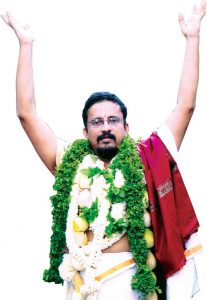

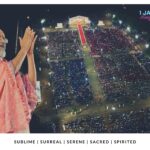
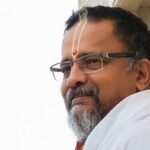
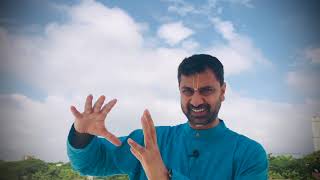
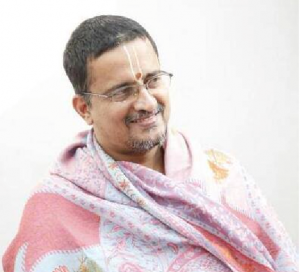

RadheRadhe
Beautiful article Nishaji. Very thankful for this and the picture of the holy feet of Guruji in the website.
Shobha Parsu, Atlanta
Very nice! Very beautiful! Superb!
Krsna condemns, avajananti mam mudha manusim tanum asritah [Bg. 9.11]. Anyone who thinks that Krsna has a different soul… No. Krsna and Krsna’s so-called soul, the same thing. There is no difference. That is the… Otherwise how Krsna can lift, as a seven-years-old boy, Govardhana Hill? Is it possible by this material body? No. That is not possible. This is common sense. But they cannot understand Krsna, mudha. Avajananti mam mudha. Mudha!!!
Advaitam acyutam anadim ananta-rupam adyam purana-purusam nava-yauvanam ca [Brahma samhita 5.33]. Sastra says He has got ananta-rupam, but still one. There is no difference. They cannot understand the Absolute Truth, and they like to comment upon it foolishly.
Therefore Sanatana Gosvami says that don’t hear anything from the Mayavadi, avaisnava. Mayavadi means avaisnava. Sanatana Gosvami says that sravanam na kartavyam putam hari-kathamrtam. Sravanam na kartavyam: “Those who are not Vaisnavas, from them do not hear the transcendental topics.” Avaisnava-mukhodgirnam putam hari-katham, sravanam na kartavyam. He has warned, “Don’t hear. Who is not a Vaisnava, don’t hear from him at least Gita, Bhagavatam. Or any sastra, don’t hear,” because they do not know what is actually the position.
Even Sankaracarya, he also says sa bhagavan svayam krsna. Narayanah parah avyaktat. Don’t bring Narayana in this material world. So… Bhaja govindam bhaja govindam bhaja govindam mudha mate. “You rascal, you have studied so much grammar. Now give up all this. Bhaja govindam, govinda bhaja.” Nahi nahi raksati dukrn-karane: “Your grammatical knowledge, du-pratyaya, krn-pratyaya, lin-pratyaya, din-pratyaya, oh, this will not do.” Bhaja govindam mudha-mate, prapte sannihite karana, hita kala-marane: “This is… Jugglery of words will not save you. This is my final instruction.” Mayavadam asac-chastram pracchanam bauddham ucyate. Kalau brahma-murtina. He has some business to do that, but actually, we should not hear about…, especially Srimad-Bhagavatam. Therefore Sripada Sankaracarya avoided to write any comments on Srimad-Bhagavatam. He has written comments on Bhagavad-gita, but he has completely avoided to write any comment on Bhagavata because he knew that “I am doing the wrong thing. How can I touch Srimad-Bhagavatam?”
Parshuram Raghu